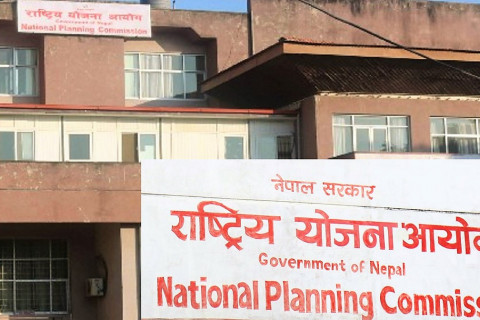
Kathmandu : The sexual and gender minorities (SGM) have welcomed and praised the inclusion of programmes and plans targeting SGMs in the 16th Plan prepared by the National Planning Commission and the Cabinet of Nepal.
Sunil Babu Pant, Asia’s first openly gay former parliamentarian of Nepal, has expressed his pleasure for contributing to the Plan as an expert on SGMs. “I am very pleased that I was invited by the Planning Commission to contribute to the 16th Plan, as an expert on gender and sexual minorities. I highly value the contributions made by all gender and sexual minority community-based organisations across Nepal to this 16th National Plan,” he said in a statement.
According to the statement, the 16th Plan, prepared by the NPC and approved by the Cabinet, is the first to extensively include programs and plans targeting gender and sexual minorities. The NPC has conducted extensive groundwork for this purpose. Discussions held at the national and local levels have included gender and sexual minority communities.
The key topics included in the 16th Plan are as follows:
– Structural Transformation: Major areas include gender equality, social justice, and an inclusive society.
– Labor Management: Improvements are aimed at eliminating gender discrimination and inequality in the labor market and establishing good labor governance.
– Ending Harmful Practices: Efforts include ending child marriage and forced marriages of gender and sexual minorities by addressing and abolishing social structures and values that support these practices.
– Identification and Classification: The plan aims to objectively identify and classify gender and sexual minorities, institutionalize an integrated management information system with disaggregated data on gender equality and social statistics, and ensure that essential groups are adequately included.
– Sustainable Development Goals: The plan seeks to implement the “Leave No One Behind” approach by integrating, mainstreaming, and localizing the concerns of women, children, senior citizens, people with disabilities, gender and sexual minorities, marginalized and deprived communities, and those needing special protection into policies, laws, plans, programs, and institutional structures at all levels of government.
– Empowerment and Inclusion: The plan adopts transformative strategies to implement programs based on empowerment, inclusion, and mobilization, aligning them with local policies and priorities.
– Proportional Inclusion: Strategies for proportional inclusion based on demographic ratios and capacities at all levels of the state, ensuring gender empowerment, disability inclusion, and social inclusion in all development processes.
– Policy Formulation: Ensuring that the formulation, prioritization, implementation, monitoring, and evaluation of policies, plans, programs, and activities for targeted groups and communities incorporate their needs, demands, leadership, and participation.
– Balanced Development: Promoting balanced and inclusive development across provinces and local levels by enhancing the leadership and capacity of targeted groups, communities, and genders.
– Multisectoral Approach: Adopting a life-cycle-based, multisectoral, and multi-stakeholder approach to policy formulation and implementation, ensuring a dignified life for all individuals, including women, children, senior citizens, people with disabilities, and gender and sexual minorities, by increasing their access to, availability of, and utilization of technology and anticipating and mitigating risks and violence.
– Integrated Management Information System: Developing an integrated management information system with disaggregated data based on the identification of targeted groups and communities to make policy, plan, program formulation, implementation, and monitoring realistic, and strengthening constitutional commissions established for the upliftment and development of targeted groups with resources for research and awareness.
– Judicial Reforms: Improving the justice system for gender and sexual minorities by ensuring access to simple, accessible, and prompt services in matters such as domestic violence and all forms of violence, discrimination, exploitation, human trafficking, illegal transportation, sexual abuse, and issues concerning children, adolescents, people with disabilities, gender and sexual minorities, and senior citizens, and enhancing the capacity of local judicial committees to make the justice system victim-friendly.
– Positive Discrimination: Adopting positive discrimination policies to prioritize public service delivery and employment reservations for specific castes, classes, and communities that are weak in terms of demographic proportion and socio-economic and human development.
– National Identity Card System: Integrating all targeted groups and communities, including people with disabilities and gender and sexual minorities, into the national identity card system, and facilitating and standardizing the citizenship acquisition process for the gender minority community. Conducting awareness and empowerment programs related to sexual minorities.
– Promoting Entrepreneurs: Promoting model entrepreneurs based on contributions from domestic, small, and micro enterprises operated by members of gender and sexual minorities and other targeted groups and communities.
– Inclusive Infrastructure: Making public spaces, public service offices, and other infrastructures accessible and friendly to people with disabilities, senior citizens, children, and gender and sexual minorities.
– Mandatory Psychosocial Counseling: Ensuring the mandatory provision of psychosocial counselors in every municipality and the effective management of safe shelters for women and targeted groups and communities in every municipality.
– NGO Code of Conduct: Developing and implementing a code of conduct for NGOs and increasing the proportion of gender-responsive budgets from 40% to 50% at all levels of government.
Although the programmes included in the Pan for SGMs may not meet all their needs and rights, according to the statement, their effective implementation can provide some relief. We urge the government, donor agencies, the United Nations, and all partners to provide resources to implement these programs with priority for this community.
Nepal’s 16th Plan recognises SGMs, aiming to end forced marriage involving the community
Copyright © All right reserved to pahichan.com Site By: Sobij.